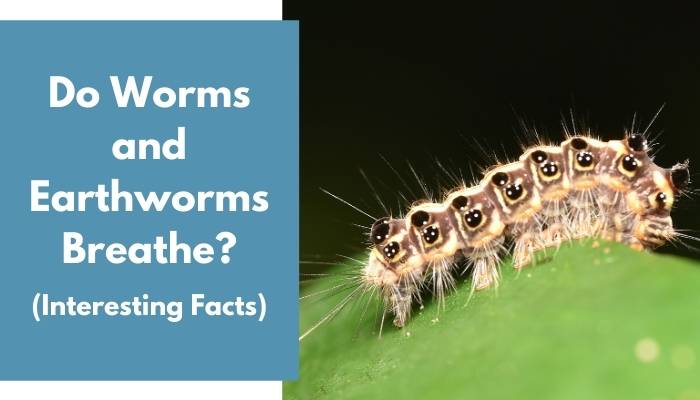Worms and earthworms are fascinating creatures, and it is so due to many things. For instance, these animals differ from other animals in many ways. Among the exciting things about them is the fact that they don’t have noses and lungs.
Yep, you heard it right. Worms don’t have lungs or nose. However, since they are living organisms, they need air to thrive. Thus, it begs the question:
Do worms and earthworms breathe? Yes, worms and earthworms do breathe. However, instead of breathing through their lungs, they do so through their skin. Worms may not have a nose and a pair of lungs to breathe. Still, they have moist skin due to mucus, allowing the air to dissolve the oxygen and place it in the bloodstream.
Worms never run out of ways to fascinate us. While they can seem dirty and disgusting, they remain a surprise for many people with curious minds.
If you want to know more about how they breathe, read on. In this article, we’ll cover everything you need to know about the breathing process.
Without further ado, let’s get into it!
Contents
Do worms and earthworms breathe air?
The short answer is yes. Both worms and earthworms need air to survive. In particular, they need oxygen just like humans and other animals.
However, their way of breathing and taking in oxygen is different from ours. Since worms don’t have a nose and a pair of lungs, they don’t breathe air as we do.
Instead, they use their skin for breathing. Interesting, right?
Worms and earthworms have moist skin, and it’s due to the mucus that covers their body.
The said mucus dissolves the air that touches it. Once the oxygen gets dissolved, it would then pass into the worms’ bloodstream.
In short, their skin is their only form of breathing, allowing the oxygen to pass right through it.
Related Articles:
Do worms use lungs for breathing?
No, worms don’t use lungs for breathing. Worms don’t have a pair of lungs, to begin with, and they also don’t have noses where they can take in air.
Instead of lungs, they use their skin for breathing. Their skin has a mucus covering that dissolves the air and transfers it into the bloodstream.
Since the mucus allows them to breathe, worms need to stay moist or slimy so they can breathe.
For this reason, they cannot get exposed to direct sunlight. The harsh light and heat will vaporize the mucus and dry out.
A worm that gets its skin dry would be like us when we suffocate. Thus, worms usually stay underground and only come to the surface at night to look for food.
How do worms breathe underwater?
Another great thing about worms is that they can breathe underwater, and it’s all because they use their skin.
Air dissolves on the mucus of their skin. Since the water helps maintain that moisture, they would have an easy way of breathing.
It’s also the reason why worms can’t survive under direct sunlight or on a dry surface. Such environments would dry out their skin, and they would die from suffocation.
Do worms have noses?
Worms don’t have noses. In fact, they also don’t even have eyes, ears, and hands. For this reason, they don’t sense and take in essential components in the same way we do.
For instance, worms breathe through their skin since they don’t have noses and lungs. They also don’t have eyes, but they have light and dark receptors to sense light and dark.
Moreover, worms don’t have ears to hear or hands to feel, but their skin can sense vibrations of animals nearby.
In general, worms lack many of the senses, unlike other animals or us. Nevertheless, they have the tools that compensate for the absence of those parts.
Do worms need carbon dioxide?
Like us, worms need oxygen, and they would spit and release the carbon dioxide out.
Oxygen is more important, and it’s the necessary air since it helps break down food and other nutrients.
Still, worms breathe differently than even other animals or us. Instead of a nose and a pair of lungs, they use their skin as their breathing tool.
Their skin is covered with mucus that dissolves the air it touches. It would then transform the oxygen and distribute it through the bloodstream.
For this reason, worms need to stay moist to breathe appropriately. If they dry out, they would immediately suffocate and die.
Do worms need oxygen to live?
Worms do need oxygen to live. As I said, oxygen is as crucial for worms as it is for us.
It’s all because oxygen helps break down the food and nutrients and distribute them in the bloodstream.
Without oxygen, worms won’t likely survive like us. For this reason, they need to stay moist and prevent harsh light and dry environments to avoid suffocation and death.
Summary
Worms are fascinating animals, and they can be so as soon as you realize how they breathe. These animals don’t have lungs and nose, but they still need air.
For this reason, they breathe through their skin instead of noses and lungs. Their skin has mucus covering it entirely. The sticky substance dissolves the air and places the oxygen in the bloodstream.
Thus, worms need to stay moist so they can breathe properly. It’s also the reason why they need to avoid harsh heat and dry environments since it will cause them to suffocate.
Resources
Image credits – Canva



